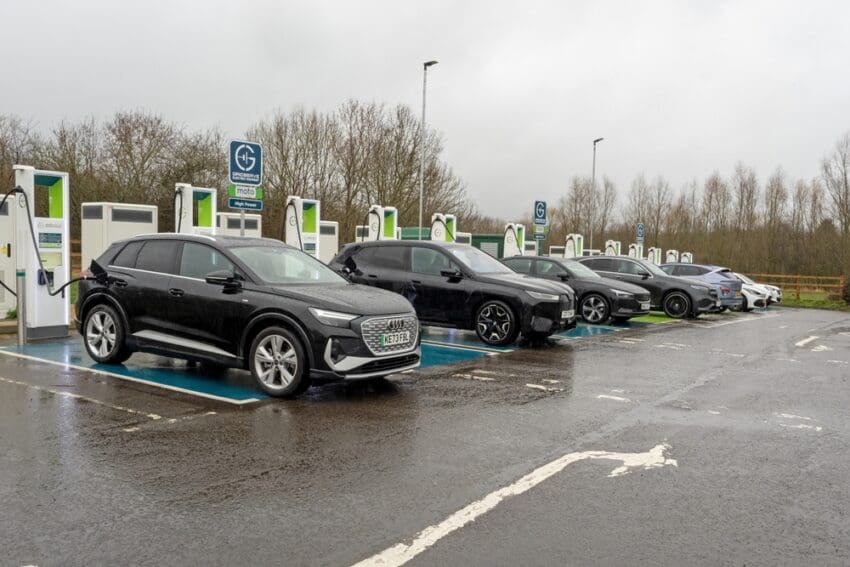Cutting ‘gulf’ in charging costs is vital, says RAC
The RAC has called for action to cut the cost of public EV charging after its research revealed prices remained stubbornly high even as wholesale energy costs have fallen.
The motoring organisation warned that there was a ‘gulf’ between public and private charging costs that left drivers without a home charger paying up to 10 times as much.
Its spokesperson, Rod Dennis, said that the root causes of the issue meant it was unlikely to change without intervention from government or regulators, leaving those without private charging paying a steep penalty.
The RAC’s Charge Watch found that despite wholesale energy prices dropping, the price of public charging has remained virtually unchanged. Wholesale prices have fallen from record high of 51p/kWh in August 2022 to 9p/kWh in August 2024.
The average cost of a rapid (50kW-149kW) pay-as-you-go charge is 79.19p per kWh, virtually unchanged from the 79.55p at the start of the year but up 4% from a year ago and up 28% on two years ago. That means to charge an average family car (64kWh battery) from 10-80% costs £41.18. It makes the UK one of the most expensive places in Europe for public charging.
Using an ultra-rapid charger (150kW+) costs a similar 77.67p per kWh, making a 10-80% charge cost £40.39. And on slower 7kW kerbside or lamppost chargers, drivers still pay 49p/kWh.
In comparison, a driver taking advantage of an off-peak EV tariff will pay as little as 7p/kWh, equivalent to £3.13 for a 10-80% charge. Even drivers on a standard domestic tariff of 25p/kWh will pay £11.20.
Frustrating lack of movement
RAC spokesperson Rod Dennis said: “Drivers of electric vehicles might be frustrated that the cost to use rapid or ultra-rapid chargers remains stubbornly high, despite wholesale energy prices dropping. But they might also be surprised to learn that the actual cost of electricity they are using when they charge up makes up a relatively small part of the total price they have to pay.”
He explained that high charges levied on the networks for grid upgrades and connections were part of the reason behind the high costs, as well as companies funding future investment through charging costs.
He also said that, unlike the domestic energy market, there is no electricity price cap on business energy supplies, meaning CPOs are more vulnerable to energy price rises.
He said: “Charging networks are spending enormous sums of money now to install the charging infrastructure that an increasing number of drivers will be using in the years to come, as more of us switch to EVs. Figures show that almost twice as many of the fastest chargers have so far been installed this year compared to last, and nearly four times as many compared to 2022.
“Of course, not all drivers depend on these fastest, high-powered chargers, but they are a crucial element of the charging mix.
“Our figures highlight the huge gulf in prices between those paid by EV drivers to use public chargers, and those that homeowners with EVs pay at home.
“For these reasons, it’s vital that public charging costs for drivers come down. Reducing the rate of VAT charged on electricity sold at EV chargers from the present 20% to match the 5% charged to domestic customers would be a huge help, but this wasn’t included in last month’s Budget.
“The best prospect of lower prices may come from Ofgem reviewing and, in turn, reducing the additional charges the charging networks have to pay. If these costs come down, drivers could at last expect cheaper public charging costs in the future.”
Industry demands reforms
Vicky Read, CEO of charging industry body ChargeUK, said: “We believe reforms are needed to help charge point operators offer public charging that is as affordable as possible.
“The sector has committed to spend £6 billion ahead of demand and profitability to deliver the charging infrastructure that the UK needs. With a public charger being installed every 25 minutes and the network expanding by 42% a year, we are on track to do this. Our members are also committed to making charging affordable as possible, because we know this is a key consideration in the decision to switch to EVs.
“But operators are faced with significant costs outside their control. VAT charged at 20% for public charging (versus just 5% at home), standing charges for rapid charging that have risen more than 10-fold in the past 18 months, wholesale electricity prices that remain among the highest in the EU28, and the fact that operators in the UK do not benefit from carbon credit schemes, unlike many of our European counterparts.
“We call on the government and Ofgem to act now to ensure that affordability is not a hurdle in the transition to EVs.”
